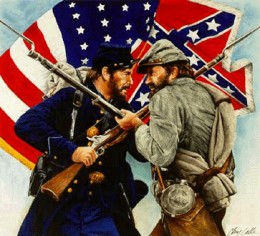What was the Civil War REALLY about?
What was the Civil War REALLY about?
The common answer is "slavery". But others say the War was fought for alternative reasons. What were they?
The civil war was about a whole hell of a lot more than American text books will let you know nowadays, as the war was LOST by America in the end. Besides slavery and the rights of states to succeed, Lincoln famously said, and I praphrase; "I've the Southern army before me; and the banks at my rear, of the two enemies I fear the banks at my rear the most."
. . . .and as soon as the war was over, he was killed by an internationalist assassin. Jackson got rid of the Rothschild banks, and was almost assassinated, but the assassin's pistol's misfired. Garfield talked about the wicked manipulations of this nation by international "Jewish" bankers, and was murdered soon after inauguration. JFK proposed a bill to get rid of the federal reserve(Rothschild international bank), and was murdered in Dallas.
Since the time of JFK, every last president in this nation has been David Rockefeller's pawn; and Rockefeller has always been right next to Evelyn De Rothschild and N.M. Rothschild and Sons criminal international banking crime syndicate..- Old Empresarioposted 13 years ago
0
Basically, nearly every different answer to this question is correct. The top 5% of the wealthiest southerners made their money by selling cotton to Europe. They wanted slaves and free trade to maintain their wealth and power. The newspapers told the other 95% that they would be fighting for states' rights (which they technically would be)
The top 5% of the wealthiest northerners were developing manufacturing, railroads, mining, and infrastructure. They wanted high tariffs to reduce competition from Europe. They used poor immigrants to work the factories and to serve in the army.
Abolitionism was a powerful movement mid-century in the US. Abolitionists united with the industrialists in the north and formed the Republican Party. Financial backing + moral high ground = a good historical justification for a civil War (to end slavery) No one can ever take pity on the south due to their perpetuation of slavery and their treatment of blacks after the war. Read with interest the answers below. These Hubbers obviously know their United States History.
It's interesting that the British backed the South. But things were also changing rapidly in England. In 1833 the government over there had outlawed the 'Slave Trade' so it was getting difficult for those English owned businesses in the West Indies to get further unpaid labour.
We need to remember that hundreds of thousands of slaves came out of Africa and went not only to North America, but Central and South America as well. Also the numerous islands of the Carribean. There was an awful lot of vested interested in keeping it all going.There were nearly a half-dozen good reasons for the war, and in order of consideration:
1. Economic differences
These issues were hot-button back in the day. The North was progressing economically while the South was entrenched in slavery and cotton. It was expensive to switch crops.
2. State vs. Federal rights
Many states wanted to retain the rights to reject federal acts (such as anti-slavery laws) and to maintain a weak central government. Others wanted a stronger central government to turn to for leadership in overall growth and to settle disputes between states. When 'nullification' was rejected as part of the Constitution, many states began to consider secession.
3. Slavery in the territories
Between the Wilmont Provisio and 'Bleeding Kansas' territories eventually were given the right to decide whether they would be anti-slavery or pro-slavery. This dispute would eventually lead to secession.
4. Growth of the Abolitionist movement
The issue was becoming polarized due to several things, such as Uncle Tom's Cabin, and Dred Scott. More northerners were against slavery, and they were putting pressure on Washington to change things.
5. The election of Abe
Before he was even president, the South seceded because they thought he was anti-slavery (Lincoln was, but he would have tried to reach a compromise to prevent the breakup of the Union). This directly led to the war.
So in the end, the Civil War was about the economics of slavery, and the morality of owning slaves, and the legality of subjugating any living thing. But it all started because of money.I will emphasize on what leads to civil war.
1. Marginalization: When a certain race feels marginalized from allocation/distribution of resources from central Government.
2.Quota system: When there is an imbalance in appointments,Disbursement of funds etc.
3.Election Rigging: When there is flaws in electoral system.
4.Internal colonialism: When the central Government is being controlled by dictators.
All these lead to civil war and civil war is nothing but uprising,clash of common interest that lead to genocide.the civil war is commonly misconseived as a war faught over slavery, but this is false. lincoln didnt "care" about the slaves. it was a good political move at the time and more money could be made out of his decision. thats just how i feel and what society has taught me
The South became paranoid and decided to tail out of the United States. Their paranoia came from various sources: northern abolitionists, a larger northern population, a higher number of northern states once California was admitted in 1850, and political disagreements caused by the economic differences between the regions. Many southerners felt that the north was becoming the dominant region of the country, and there was a threat that the north at some point might change the southern way of life. Most northerners, however, did not want to abolish slavery. Many northerners were making money off of it, after all. But perception is more important than reality, so when Lincoln was elected, southerners saw that as a sign of a complete northern takeover.
The north, of course, could have let the south secede. So you could just as easily hold the north responsible for the war. Here's a hub that I wrote a while back about the costs of the Civil War, costs that could have been avoided if the north had made a different decision:
http://hubpages.com/hub/costcivilwar
Related Discussions
- 113
An Uncivil Peace--Is the US headed toward another Civil War?
by pgrundy 14 years ago
We watched Ken Burn's series on The Civil War this past weekend (all umpteen episodes---my partner is sick and it is winter in Michigan, so you know, we had time), and I was struck by the similarities between Lincoln's era and our era, and the similarities between Lincoln and Obama.Not all the...
- 10
What were the political and economic causes of the Civil War?
by David Stillwell 12 years ago
What were the political and economic causes of the Civil War?When you read historical accounts of the civil war, one of the key statements is that the war turned brother against brother... literally dividing houses. So what are the political and economic causes of the Civil War? What were the...
- 35
Did the South have any legitimate reason for seceding from the Union?
by Paul Swendson 13 years ago
The South is generally described as the bad guy in The Civil War. Do you think that their point of view had any legitimacy?
- 15
What aspect of the Civil War in the USA intrigues you as a reader?
by Wayne Brown 13 years ago
What aspect of the Civil War in the USA intrigues you as a reader?
- 13
Should the United States enter into a new civil war?
by Daniel J. Neumann 12 years ago
Should the United States enter into a new civil war?My answer is no. It'll bring suffering to America (the whole continent). Explain your stance.
- 32
Do Conservatives believe in a United States or a united States of America?
by Scott Belford 10 years ago
Do Conservatives believe in a United States or a united States of America?The Declaration of Independance refers to the united States while the Constitution uses the phrase United States, with a capital 'U'. The Ariticles of Confederation and the Continental Congress epitomize a united States...













